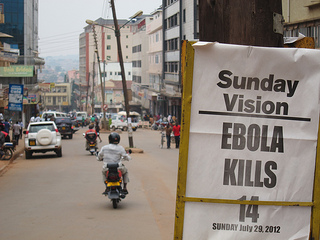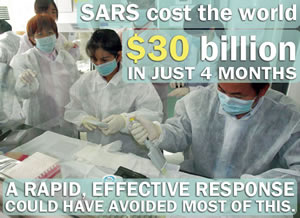Why Global Health Security Matters
Disease Threats Can Spread Faster and More Unpredictably Than Ever Before
People are traveling more. Food and medical product supply chains stretch across the globe. Biological threats (such as Middle East respiratory syndrome coronavirus, or MERS-CoV) and drug-resistant illnesses pose a growing danger to people everywhere, whether diseases are naturally occurring, intentionally produced, or the result of a laboratory accident. In today’s interconnected world, poorly treated cases of TB or pneumonia in Asia and Africa have shown up in U.S. hospitals within days.
Emerging global disease threats have created the opportunity to forge new global solutions such as the International Health Regulations (IHR), signed by all 194 member states of the World Health Organization. Substantial investments have been made to combat infectious disease threats. We now have greater global health security capacity than ever before.
We Are Not Yet Safe
There is much more to be done. Although every member state has signed on to the IHR, fewer than 20% of countries reported in 2012 that they have fully achieved compliance with the IHR and are fully prepared to detect and respond to disease threats. The aim of the Global Health Security agenda is to close this gap.
That’s why CDC is committed to global health security as a priority at the highest levels, helping develop health systems that prevent avoidable epidemics, detect threats early, and respond rapidly and effectively.
Global Health Security Provides Protection From Infectious Disease Threats

A disease threat anywhere can mean a threat everywhere. It is defined by
- the emergence and spread of new microbes;
- globalization of travel and trade;
- rise of drug resistance; and
- potential use of laboratories to make and release—intentionally or not—dangerous microbes.
As dangerous new threats are emerging, familiar microbes (such as tuberculosis) are becoming resistant to drugs that once kept them at bay. We have strains of organisms spreading in this country that are resistant to most available antibiotics. Today, in communities across the U.S., someone in a nursing home or a hospital is fighting an infection that doctors have limited or no tools to treat. The GHS initiative will lead to earlier detection and more effective control of these resistant germs before they spread to the U.S.
Global Health Security Is Economically Smart

Countries better insulated from disease threats mean safer environments for Americans to travel to and do business. Healthier countries are more stable and prosperous – they are more viable trading partners.
Pandemic disease threats and ineffective responses can have devastating impact on public health and the global economy.
- SARS cost $30 billion in only 4 months. GHS means safer nations, more stable economies, and fewer failed states.
- AIDS has imposed an economic burden worldwide and has taken an especially heavy toll in low-income countries. A sizeable portion of that cost is a result of AIDS spreading silently for decades before detection and response.
- Pandemic influenza can cause rapid and widespread death and disruption, stressing commerce and national economies.
Global Health Security Strengthens Public Health Systems

CDC strengthens other global health programs—like maternal and child health, flu prevention, and immunization—through the cross-cutting global health security activities around the world. These activities include helping build better lab systems; create faster and more accurate data sharing; establish and improve emergency operations centers that can respond more quickly to all public health crises; and support nationwide surveillance systems that enable real-time disease tracking and reporting.